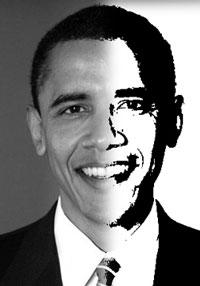By Ron Walters
-Guest Columnist-

I was asked by a reporter at one point during the primary elections whether the issue of race would continue to play in the fall campaign and I responded that it would as long as Barack was Black–which meant that his race would be an unavoidable target for his opponent and that his own community would often throw some fuel on the fire.
True to form, in the months of July and August, race revisited the Obama presidential campaign in what might be called the “double-dutch” dynamic of both the campaign between Barack Obama and John McCain and those within the Black community.
The campaign against Obama returned to the issue of race because of a campaign ad that was released by the McCain campaign that argued Obama was tantamount to Brittany Spears or Paris Hilton, beautiful and glamorous stars without much substance.
Obama retorted that the McCain forces were seeking to make Americans afraid of his candidacy because he was an untraditional candidate, because he did not look like other candidates on the dollar bills, and etc.
On July 31, McCain’s campaign manager Rick Davis released a statement refuting the fact that McCain was running a racist campaign (he planted the word “racist”) causing Obama to call a press conference Aug. 2 to explain once again his reference. Using the concept that he was not out of “central casting” he said that it was irrefutable that he did not look like other candidates: He was younger, born in Hawaii, lived in Indonesia, his name was Barack Obama, etc.
This incident was initiated by a speech where Obama attempted to caution his supporters to look out for the McCain camp’s attempt to paint his candidacy was “risky” by pointing to his personal characteristics. His reference to his race, however, as he had done several times in the primaries, this time gave the McCain campaign an opening to attack Obama for “using the race card” and inferring that the McCain was racist. While this may have been the immediate reason for the attack by Davis, this also may have constituted a dedicated strategy that he was waiting to use because of the perceived effectiveness of the use of negative race attacks with voters in Indiana, Kentucky, and Southern Ohio, Western Pennsylvania and West Virginia and others.
In fact, by reminding those voters–I have referred to this as “blackening him”–that Obama was a Black American reminded them also that they probably should not vote for him according to the traditional values of their own communities.
Then, when Obama spoke at a town hall meeting in St. Petersburg, Fla., the question and answer period yielded a heckler who charged that Obama had avoided speaking to the concerns of the Black community, asking when or whether he would begin to do so? Obama fielded the question and asserted that he has spoken about Katrina, urban policy and other such concerns. But this is evidence that the line of concern surfaced by Rev. Jesse Jackson, Sr. lives on.
My own experience with this issue is pertinent. On a national radio show, when I sought to explain Rev. Jackson’s comment as a legitimate concern a woman called in to say that I was only “bringing Barack Obama down.” We should just “let him get in there and see what he does.”
When I explained that this was a risky use of our voting power and amounted to the lack of a political accountability, she began to understand my point.
Of course, the danger is that any reference to a Black agenda would be perceived by some Whites as favoritism to Blacks and might cost Obama some votes.
So, his challenge will be to deal with this issue in a manner that links Black suffering and restorative public policy to Whites and others who suffer similarly. In any case, this concern will continue to be voiced until Obama respects the Black vote enough to address these issues as a priority of his administration should he win.
So, race will not disappear from this campaign. In fact, it has intensified as the public itself has sought to marry the two: witness the CNN special on Black America, the race survey of the New York Times, the National Press Club conference on Racial Reconciliation by former Secretary Bill Cohen and his Black American wife Janet, all targeted to illuminate Obama’s reception of the nomination on Aug. 28, the date Dr. Martin Luther King, Jr. gave the “I Have A Dream” address. Blackness is an unavoidable coloring of this campaign.
(Ron Walters is director of the African American Leadership Center and Professor of Government and Politics at the University of Maryland College Park. One of his latest books is “Freedom is Not Enough: Black Voters, Black Candidates and American Presidential Politics.”)












